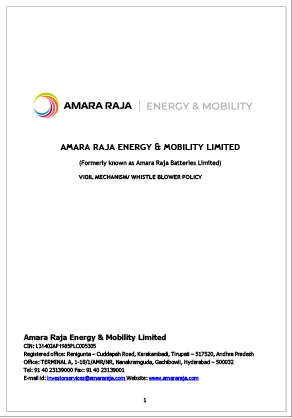Governance Framework
Besides the statutory Board of Directors, the respective Group Companies are headed by Managing Directors/CEOs who along with the Executive Committee are responsible for the vision, strategy to achieve the vision, performance and capability building for the respective businesses of the Company. Amara Raja at the Group level has put in place a two-tier structure of governance to ensure business sustainability.
Amara Raja Corporate Council (ARCC)
The ARCC provides strategic direction, enterprise leadership and creates a shared vision and value-system, across the business and companies that make the Amara Raja Group.
The ARCC displays the breadth and depth of our talented human capital to steer strategic plans and achieve our Group Vision. Working together, we create value while staying true to our common purpose and core values.
Growth Committee (GROCOM)
The second tier comprises of GROCOM which is a larger leadership body which comprises the senior leaders across the Group including all business heads, group function heads and the senior operations and marketing heads.
GROCOM as a collaborative leadership team meets periodically to discuss key business challenges, best practices and people aspects, in order to facilitate synergy and growth across the businesses.
The above two tier structure ensures that the strategic management being free from the task of day-to-day executive management, remains focused and energised on enhancing the quality, efficiency and effectiveness of each Company.
People Strategy
People, one of our critical strategic assets, who can create infinite possibilities continue to be at the core of Amara Raja’s transformative journey. We believe in and practice our philosophy - 'Gotta be a better way' which inspires us to go past limits and strive that much harder each day.
We believe in staying contemporary and focusing relentlessly on achieving results through people. Thus, for the Group as a whole, we have developed a strong People Strategy framework as part of our Governance Structure.
Through The Amara Raja Way®, we aim to achieve organization objectives in an invigorating digital work environment by excelling in people Engagement, Development and Performance.
Whistle Blower
Amara Raja believes in the conduct of its affairs in a fair and transparent manner by adopting highest standards of professionalism, honesty, integrity and ethical behavior. It is committed to developing a culture where it is safe for all people to raise concerns about any unacceptable practices and any event of misconduct.
Amara Raja has adopted a Vigil mechanism or “Whistle Blower Policy”. Under this policy all stake holders have access to the ombudsman to raise any concerns without fear.
The purpose of the policy is to provide people an avenue to raise concerns and report to the management instances of unethical behavior, actual or suspected fraud or violation of the Company’s policies and to promote responsible and secure whistle blowing and to provide necessary safeguards for protection of people from reprisals or victimization, for whistle blowing in good faith.
The policy neither releases employees from their duty of confidentiality in the course of their work, nor can it be used as a route for raising malicious or unfounded allegations about a personal situation.
